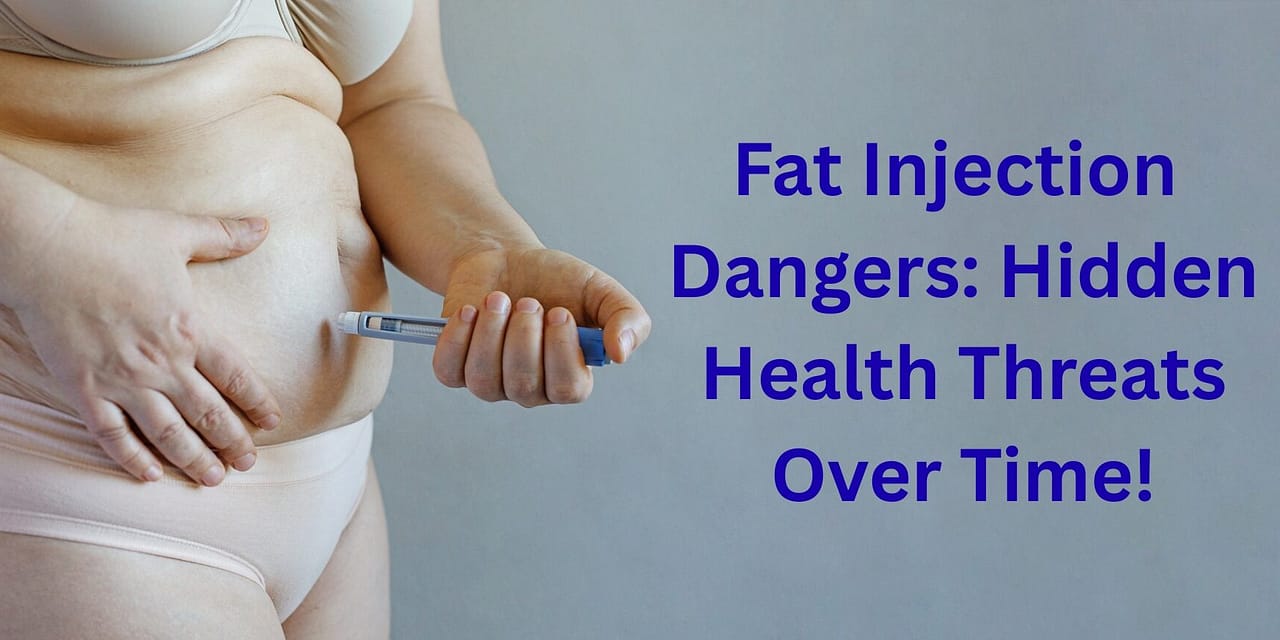Weight Loss Injections Warnings: Long-Term Safety Concerns, Cancer Risks, and Natural Alternatives.
This is an update to the post headed “Are Weight Loss Injections Safe And Effective?” dated the 6th July. Click here to read it.
Weight loss injections, often referred to as “fat jabs,” have exploded in popularity as a quick solution for shedding pounds. Drugs like semaglutide (found in Ozempic and Wegovy) and tirzepatide (in Mounjaro and Zepbound) mimic hormones to suppress appetite and regulate blood sugar, leading to significant weight reduction. However, amid the hype, emerging studies and regulatory warnings paint a more cautious picture. While these medications offer short-term benefits, questions about their long-term safety, including potential cancer risks, are mounting. This article delves into the latest evidence, packaging labels, and why experts urge more research. We’ll also explore natural alternatives for those seeking sustainable weight loss without the uncertainties. Always consult a healthcare professional before starting any treatment.
Understanding Weight Loss Injections: How They Work and Their Appeal.
Weight loss injections belong to a class of drugs known as GLP-1 receptor agonists (for semaglutide) or dual GLP-1/GIP agonists (for tirzepatide). They work by imitating gut hormones that signal fullness to the brain, slow gastric emptying, and improve insulin sensitivity. Approved initially for type 2 diabetes, they’ve been repurposed for obesity, with clinical trials showing average weight loss of 15-20% over a year.
Their appeal is undeniable: in a world of busy lifestyles, these weekly shots promise results without drastic diet changes. However, the rapid adoption, millions of prescriptions in the US and UK, has outpaced comprehensive long-term data. Regulatory bodies like the FDA and EMA have approved them based on trials lasting 1-2 years, but real-world use raises questions about sustained efficacy and safety. As one 2024 review noted, while short-term side effects are manageable, the absence of extended studies leaves gaps in understanding chronic risks.
Recent Studies Highlighting Safety Warnings.
The surge in weight loss injection use has prompted increased scrutiny, with several 2024 and 2025 studies flagging concerns. A systematic review in the International Journal of Clinical Pharmacy analysed adverse events from GLP-1 drugs, identifying psychiatric, gastrointestinal, and other issues, emphasising the need for long-term monitoring. Similarly, a JAMA Oncology study examined cancer associations, noting insufficient data to rule out risks like thyroid tumours.
In January 2025, a meta-analysis in Endocrinology and Metabolism reviewed tirzepatide, finding no overall cancer increase but stressing the reliance on short-term RCTs (26-72 weeks) and animal models. A Frontiers in Endocrinology assessment echoed this, warning of unknown long-term effects, including thyroid cancer, from rodent studies. Nature Medicine’s 2024 article highlighted that while short-term benefits are evident, long-term safety remains unproven, calling for trials beyond 1-2 years.
These studies collectively underscore a key issue: most data comes from trials focused on efficacy, (Efficacy is the ability of something, such as a drug or treatment, to produce the intended or desired result under ideal conditions), not prolonged exposure. A 2025 Guardian newspaper report on patients regaining weight after stopping drugs adds to the caution, raising NHS concerns about dependency.
Long-Term Safety Gaps in Weight Loss Injections.
One of the most pressing warnings is the lack of long-term data. FDA approvals for Wegovy and Zepbound rely on studies up to 68 weeks, yet real-world use extends indefinitely. A 2025 Reuters analysis showed improved persistence rates as shortages eased, but side effects like muscle loss remain understudied.
Experts warn of risks like gallbladder inflammation, pancreatitis, and muscle mass loss, potentially leading to sarcopenia. A UCSF article questions if benefits outweigh unknowns, noting lifelong use recommendations amplify concerns. Mental health effects, including mood changes, are also emerging, per a 2025 APA review.
A 2025 NEJM study comparing tirzepatide and semaglutide noted efficacy but urged vigilance on sustained risks. Overall, the consensus is clear: short-term gains are proven, but long-term safety requires more research.
Cancer Risks Associated with Fat Jabs.
Cancer warnings are among the most alarming. Rodent studies show GLP-1 drugs increase thyroid C-cell tumors, prompting FDA boxed warnings. A 2024 PMC review confirmed no human patent but stressed monitoring.
A Nature study linked obesity drugs to conditions like arthritis, indirectly raising cancer concerns via inflammation. MD Anderson’s 2024 analysis suggested GLP-1s might lower some cancer risks through weight loss but noted drug-induced risks. The Sun reported in 2025 that fat jabs could interfere with HRT, potentially elevating cancer risks in menopausal women.
A Verywell Health piece discussed GLP-1 boosters but warned of unknown cancer links. While not conclusive, these findings highlight the need for caution.
Health Warnings on Packaging and Labels.
Packaging for these drugs includes explicit warnings. Ozempic and Wegovy have boxed alerts for thyroid tumors, including MTC, advising against use in those with family history. Mounjaro and Zepbound similarly warn of C-cell tumors.
EU labels added thyroid cancer warnings in 2023. General warnings cover pancreatitis, gallbladder issues, and GI problems. Eli Lilly’s open letter reiterated thyroid risks. These labels reflect animal data and call for vigilance.
Other Potential Risks of Weight Loss Injections.
Beyond cancer, risks include gallstones, pancreatitis, and mental health effects. A GoodRx article noted muscle loss concerns. APA’s 2025 review explored mood impacts.
Weight regain upon stopping is common, per Guardian findings. A Reuters study showed better retention but persistent side effects. These underscore the instructional need for informed use.
Natural Alternatives to Weight Loss Injections.
For those wary of risks, natural methods offer safer paths. The first, I would suggest, is a blend of natural herbs and plants that have been blended to boost the body’s fat-burning engine. Read about ‘Natural Alternatives To Weight Loss’ here!
Mind Change: There comes a time when you see something in the mirror, or something is said that you have not ‘picked up on’ before. But now it hits you! – You never thought it was that bad! – But now you see it! Welcome to the awakening!
What are the choices? Hunger strike? Jab yourself? Blame-who? The last of those has a little merit. You can blame the abundance of easy-to-access processed foods, – but you still chose to eat them. I will cover this point in another post and link this page to it. But for now, you have to decide. Have you come to the point where you will change from now on?
So, a change in the way you eat is your only option.
Conclusion: Weighing the Risks and Choosing Wisely.
Weight loss injections offer quick results but come with warnings about long-term safety and cancer risks. Studies highlight data gaps, and packaging labels confirm concerns. Natural alternatives are an option, but a change of diet is essential.
Popular Questions and Answers:
Can you gain weight back after stopping Ozempic?
Yes, weight regain is common after discontinuing Ozempic or other fat loss medications. This is why it’s important to develop sustainable lifestyle habits while on the medication to help maintain fat loss long-term.
What are the most common side effects of fat loss injections?
The most common side effects of GLP-1 receptor agonists like semaglutide include nausea, vomiting, diarrhea, constipation, and abdominal pain. These side effects often improve over time but can be persistent for some people.
Are there natural alternatives to fat loss injections?
Yes, there are several natural approaches to fat loss, including dietary changes, regular exercise, mindful eating, stress management, adequate sleep and natural herbal remedies. While these methods may not produce results as quickly as injections, they often lead to more sustainable long-term weight management.
How long do you need to take fat loss injections?
The duration of treatment with fat loss injections can vary depending on person needs and response to the medication. Some people may need to continue the medication indefinitely to maintain fat loss, while others may be able to transition off the medication after reaching their goal weight.
Can fat loss injections help with diabetes?
Yes, some fat loss injections, particularly GLP-1 receptor agonists, can help manage blood sugar levels and are approved for the treatment of type 2 diabetes. However, their use should be carefully monitored by a healthcare provider.
What lifestyle changes should I make while taking fat loss injections?
While taking fat loss injections, it’s important to adopt healthy lifestyle habits, including a balanced diet, regular physical activity, stress management, and adequate sleep. These changes can enhance the effectiveness of the medication and help maintain fat loss long-term.
Are fat loss injections covered by insurance?
Coverage for fat loss injections varies depending on the specific medication and insurance plan. Some plans may cover these medications if they’re prescribed for obesity or diabetes management, while others may not.
It’s best to check with your insurance provider for specific coverage details.
Can fat loss injections affect fertility or pregnancy?
Weight loss injections are generally not recommended during pregnancy or for women planning to become pregnant. Some of these medications may affect fertility or pose risks to fetal development.
It’s crucial to talk about family planning with your healthcare provider before starting any fat loss medication.






